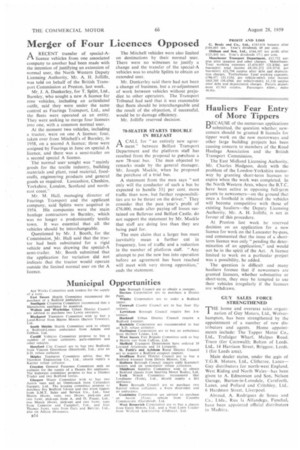Merger of Four Licences Opposed
Page 48

If you've noticed an error in this article please click here to report it so we can fix it.
rAA RECENT transfer of special-Alicence vehicles from one associated company to another had been made with the intention of justifying an extension of normal user, the North Western Deputy Licensing Authority, Mr. A. H. Jolliffe, was told on *half of the British Transport Commission at Preston, last week.
Mr. J. A. Dunkerley, for T. Splitt, Ltd., Burnley, who sought a new A licence for nine vehicles, including an articulated oUtfit, said they were under the same control as Fearings Transport, Ltd., and the fleets were operated as an entity. They were seeking to merge four licences into one, with a common normal user.
At the Moment two vehicles, including a tractor, were on one A licence; four, taken over from Mitchell's of Burnley, in 1958, on a second A licence; three were assigned by Fearings in June on special A licence, and there was a semi-trailer on a second special A licence.
The normal user sought was " mainly goods for the textile industry, building materials and plant, road material, foodstuffs, engineering products and general goods as required. Lancashire, Cheshire, Yorkshire, London, Scotland and northeast coast."
Mr. M. Hall. managing director of Fearings Transport and the applicant company, said Splitts were acquired in 1954. His companies were the main haulage contractors in Burnley, which was no longer a predominantly textile town. It was essential that all the vehicles should be interchangeable.
Questioned by Mr. J. Booth, for the Commission, Mr. Hall said that the tractor had been substituted for a rigid vehicle and was drawing the special-A semi-trailer, Mr. Booth submitted that the application for variation did not indicate that the tractor would operate outside the limited normal user on the A licence.
The Mitchell vehicles were also limited on destinations by their normal user. There were no witnesses to justify a change and the transfer of the special-A vehicles was to enable Splitts to obtain an extended user.
Mr. Dunkerley said there had not been a change of business, but a re-adjustment of work between vehicles without prejudice to other operators. The Transport Tribunal had said that it was reasonable that fleets should be interchangeable and the result of the objection, if successful. would be to damage efficiency.
Mr. Jolliffe reserved decision.
78-SEATER STARTS TROUBLE IN BELFAST
A CALL for "an entirely new agreement" between Belfast Transport Department and the platform staff has resulted from the proposal to purchase a new 78-seat bus. The men objected to remarks made by the general manager. Mr. Joseph Mackie, when he proposed the purchase of a trial bus.
A statement from the men says "not only will the conductor of such a bus be expected to handle 33' per cent more traffic than now, but further responsibilities are to be thrust on the driver." They consider that the past year's profit of E76,000, made after paying off losses sustained on Bellevue and Belfast Castle, do not support the statement by Mr. Mackie that staff are doing less than they are being paid for.
The men claim that a larger bus must inevitably mean a further cut in frequency, loss of traffic and a reduction in the number of platform staff. "Any attempt to put the new bus into operation before an agreement has been reached will meet with very strong opposition," ends the statement.




















































































































